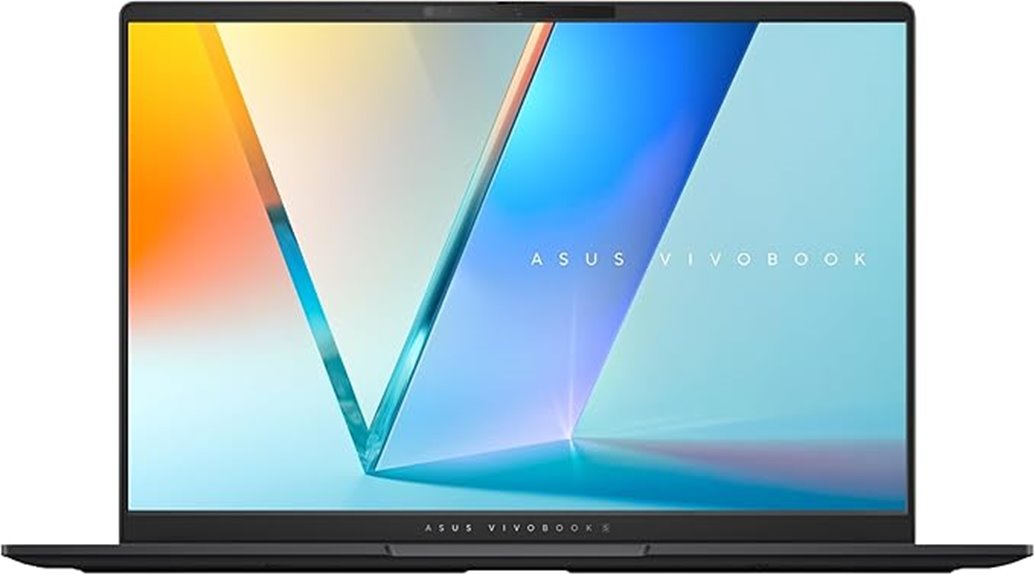Best Laptops for Penetration Testing (Top 5 Picks for 2025)
For effective penetration testing in 2025, security experts recommend five top laptops. The Apple 2024 MacBook Pro and Apple 2025 MacBook Air both offer incredible performance with M4 chips. The Acer Swift X 14 and ASUS Vivobook S 14 OLED deliver power in portable designs. The Samsung Galaxy Book4 Pro stands out for its lightweight build and exceptional battery life. Keep exploring to discover the key factors to consider when choosing the right laptop for your needs.
In the interest of full disclosure, we would like to inform you that some links on our website are affiliate links. By clicking on these links and completing a purchase from our partners, we may receive a nominal commission at no extra cost to you. Rest assured, our affiliate partnerships do not compromise the integrity of our editorial content or product evaluations. For further clarification, kindly refer to our comprehensive affiliate disclosure.
Table of Contents
What Are the Best Laptops for Penetration Testing to Buy This Year?
Here are my top picks for the best laptops for penetration testing, you can consider this year.
Apple MacBook Pro Laptop with M4 Chip (14.2-inch Liquid Retina XDR Display
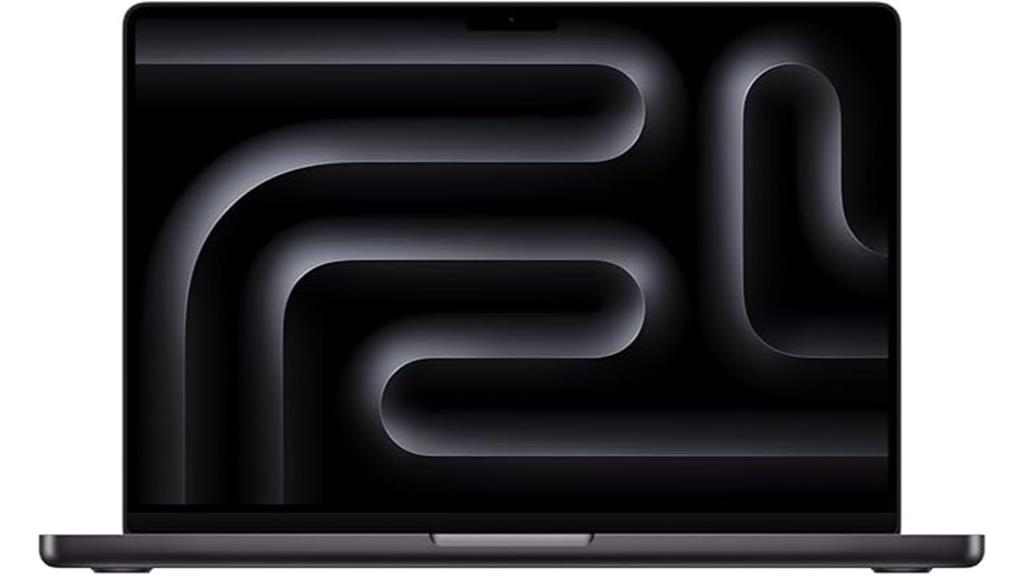
If you’re diving into penetration testing, the Apple 2024 MacBook Pro with the M4 chip is a standout choice due to its powerful 10-core CPU and GPU, which provide the speed and efficiency needed for running complex security applications. With 16GB of unified memory and a 512GB SSD, multitasking becomes seamless. The 14.2-inch Liquid Retina XDR display, boasting up to 1600 nits peak brightness, ensures you see every detail clearly. Plus, its all-day battery life means you can work uninterrupted, whether you’re plugged in or on the go. Enjoy robust app compatibility and an integrated experience with your other Apple devices.
Best For: Professionals in penetration testing and creative industries seeking powerful performance and seamless integration with the Apple ecosystem.
Pros:
- Exceptional speed and efficiency with the 10-core M4 chip for multitasking and running demanding applications.
- Stunning visuals with the 14.2-inch Liquid Retina XDR display featuring high brightness and contrast ratios.
- All-day battery life allows for uninterrupted work, whether at a desk or on the go.
Cons:
- Higher price point compared to other laptops in the market.
- Limited upgrade options for hardware after purchase.
- Some users may prefer Windows-based systems for specific penetration testing tools and applications.
Acer Swift X 14 Laptop (SFX14-72G-77NJ)
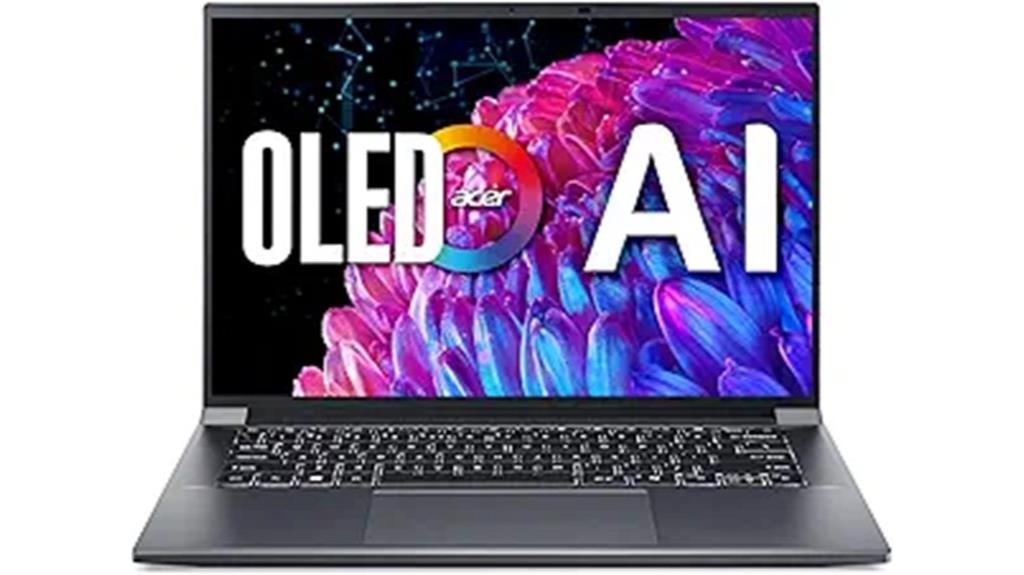
The Acer Swift X 14 Laptop (SFX14-72G-77NJ) stands out as an exceptional choice for penetration testers who demand high performance and portability. With its Intel Core Ultra 7 processor and NVIDIA GeForce RTX 4060 GPU, you’ll handle demanding software effortlessly. The stunning 14.5-inch OLED display ensures vibrant visuals while TÜV Rheinland certification helps reduce eye strain. Plus, the 16GB memory and 1TB SSD guarantee swift multitasking and storage. Collaboration is easy with the 1080p webcam and AI noise reduction features. Enhanced AI tools, accessible via a dedicated key, streamline your workflow, making this laptop a smart investment for your testing needs.
Best For: Penetration testers and creators seeking a powerful, portable laptop with advanced AI features and exceptional display quality.
Pros:
- High performance: Equipped with Intel Core Ultra 7 and NVIDIA GeForce RTX 4060 for handling demanding applications.
- Stunning display: 14.5-inch OLED screen with a high resolution and refresh rate for vibrant visuals and reduced eye strain.
- Enhanced collaboration tools: Features like a 1080p webcam and AI noise reduction improve video call quality and focus.
Cons:
- Limited upgradeability: The internal components such as RAM are soldered, potentially restricting future upgrades.
- Higher price point: Premium features may lead to a higher cost compared to similar laptops.
- Weight and portability: While portable, it may be heavier than some ultra-lightweight alternatives on the market.
Apple 2025 MacBook Air 15-inch Laptop with M4 Chip
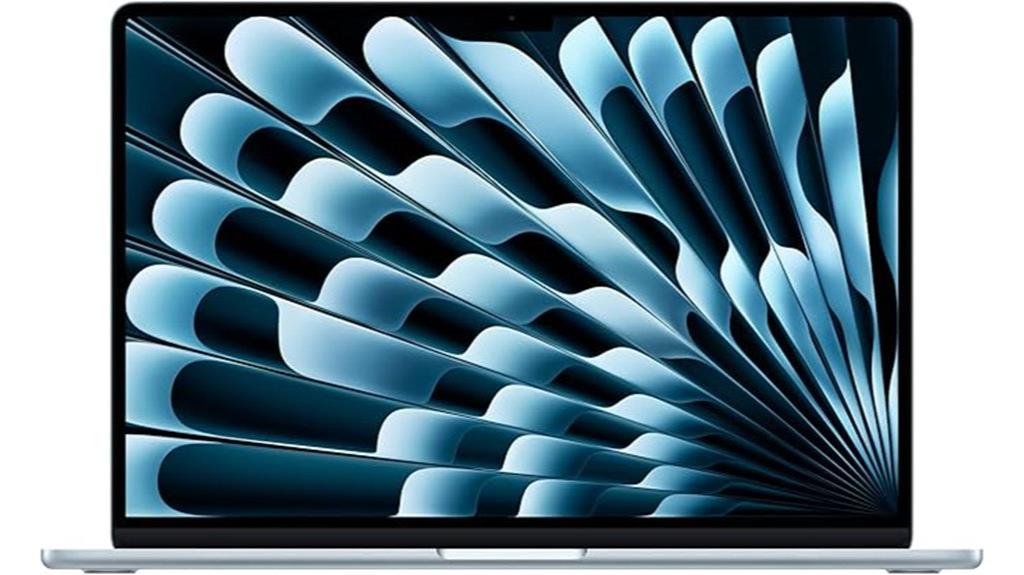
For penetration testers seeking a reliable and powerful tool, the 2025 MacBook Air’s M4 chip stands out with its impressive performance and speed. With up to 18 hours of battery life, you can tackle tasks without worrying about recharging. The 15.3-inch Liquid Retina display offers stunning visuals, supporting 1 billion colors for sharp detail. You’ll appreciate the 12MP Center Stage camera and immersive audio from six speakers during virtual meetings. Connectivity options include Thunderbolt 4 ports and Wi-Fi 6E, ensuring you stay plugged into your work. Plus, built-in privacy protections help keep your sensitive data secure.
Best For: Penetration testers and professionals who need a powerful, portable device for multitasking, video editing, and secure data handling.
Pros:
- Impressive performance with the M4 chip, ideal for demanding tasks like video editing and gaming.
- Long battery life of up to 18 hours, allowing for extended use without frequent recharging.
- High-quality display with 1 billion colors for vibrant images and sharp text, enhancing productivity and media consumption.
Cons:
- Limited upgradeability as MacBooks generally do not allow users to upgrade components like RAM or storage post-purchase.
- Higher price point compared to some competitors, which may not suit budget-conscious users.
- Fewer ports than some laptops, which may require additional adapters for certain peripherals.
ASUS Vivobook S 14 OLED Slim Laptop (M5406WA-DS76)
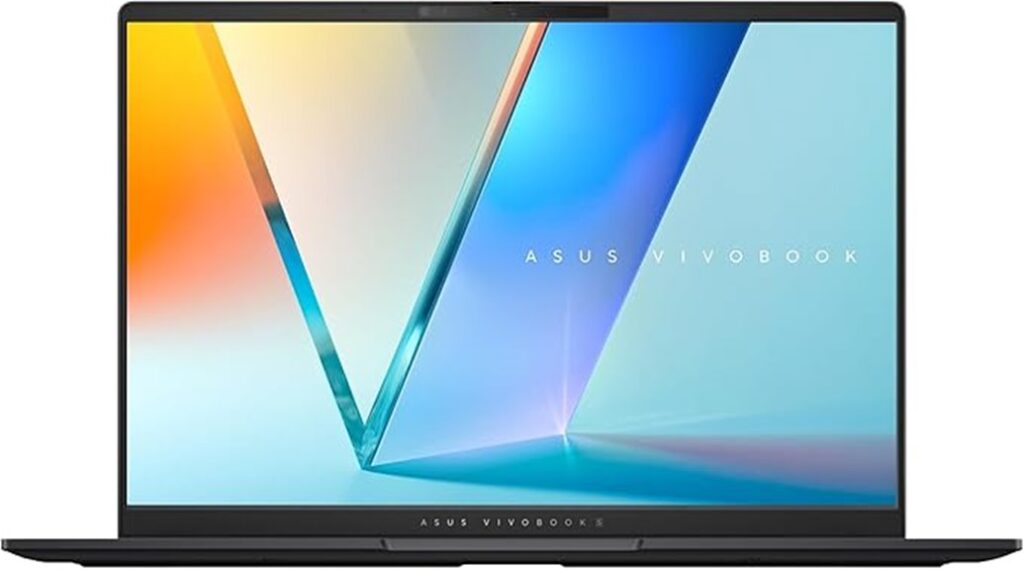
Penetration testers looking for a powerful yet portable solution will find the ASUS Vivobook S 14 OLED Slim Laptop (M5406WA-DS76) particularly appealing. With its AMD Ryzen 9 processor and 24GB of RAM, you’ll enjoy seamless multitasking during your security assessments. The stunning 14” 3K OLED display delivers vibrant visuals, and its slim profile at just 0.63” makes it easy to carry around. Plus, the customizable RGB backlit keyboard enhances your typing experience in low light. With ample connectivity options, including USB-C and HDMI, this laptop is a top choice for professionals on the go.
Best For: Penetration testers and professionals seeking a powerful, portable laptop for seamless multitasking and vibrant display during security assessments.
Pros:
- High Performance: Equipped with an AMD Ryzen 9 processor and 24GB of RAM for efficient multitasking.
- Stunning Display: Features a 14” 3K OLED display with 120Hz refresh rate for vibrant visuals.
- Portability: Slim and lightweight design at just 0.63” thick and 2.87 lbs, making it easy to carry.
Cons:
- Limited Storage: The 512GB SSD may not be sufficient for users with extensive data needs.
- Single-zone RGB Backlighting: The keyboard backlighting is customizable but only in a single zone, limiting personalization.
- No Ethernet Port: Lacks a built-in Ethernet port, which may be a drawback for users preferring wired connections.
Samsung Galaxy Book4 Pro Business Laptop (NP944XGK-KG4US)
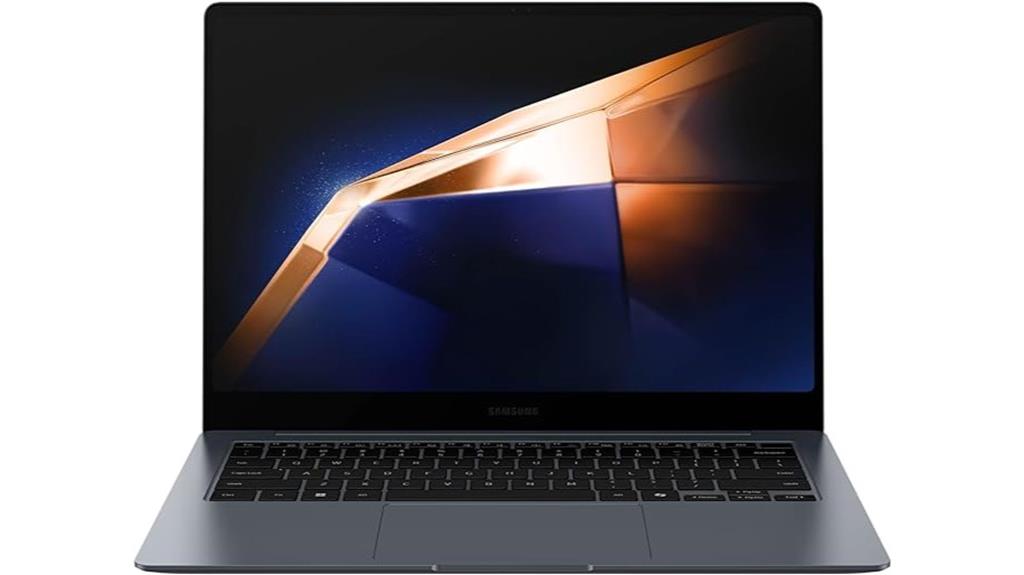
When you’re in need of a powerful, portable laptop for penetration testing, the Samsung Galaxy Book4 Pro stands out with its impressive Intel Core Ultra 7 processor and 32GB of RAM. Weighing just 2.71 lbs, its 14-inch 3K AMOLED touchscreen provides stunning visuals, making multitasking and presentations a breeze. With 1TB of SSD storage, you can easily manage large files. The battery lasts up to 8 hours, and it supports fast charging. Plus, with robust security features like Samsung Knox, your data remains protected. While it’s priced higher than some competitors, its performance and design make it a solid choice.
Best For: Professionals seeking a lightweight, high-performance laptop for multitasking, presentations, and data security.
Pros:
- Powerful Intel Core Ultra 7 processor with 32GB RAM for efficient multitasking.
- Stunning 3K AMOLED touchscreen display enhances visual experience.
- Robust security features, including Samsung Knox, ensure data protection.
Cons:
- Higher price point compared to competitors with similar specifications.
- Limited RAM upgrade options in certain regions (max 16GB).
- Perceived low quality of OEM SSD from Western Digital for the price.
READ MORE: Best Laptop for Office Work at Home, Best Laptop for Insurance Adjusters, Best Laptop for Data Scientist, Best Laptop for Data Analytics, Best Laptop for Investment Banking, Best Laptop for Social Media Marketing, Best Laptop for Music Creation, Best Laptop for Chemical Engineering, Best Laptop for Dual Monitor Setup, Best Laptop for 2d Animation
Factors to Consider When Choosing the Best Laptops for Penetration Testing
When picking a laptop for penetration testing, you’ll want to focus on several key factors. Processing power, memory, and storage are crucial for running tests efficiently, while display quality can affect your usability. Don’t forget to consider battery life and connectivity options to ensure you can work effectively in various environments.
Processing Power Importance
Processing power serves as the backbone of effective penetration testing, making it essential to choose a laptop that meets your needs. You’ll want a device capable of running resource-intensive tools and software efficiently, allowing for seamless multitasking and data analysis. Look for a higher number of CPU cores and threads, as these can significantly boost performance when executing tasks like running multiple virtual machines or conducting network scans. Integrated graphics with AI acceleration can enhance data visualization and machine learning tasks in security assessments. Additionally, opt for laptops with fast SSD storage for quicker data access and transfer rates, crucial for handling large datasets during tests. Supporting advanced software and operating systems is vital for effective vulnerability assessments.
Memory and Storage Needs
As you gear up for penetration testing, memory and storage needs become crucial factors that can significantly impact your efficiency and effectiveness. Aim for at least 16GB of RAM to run multiple virtual machines and applications smoothly, avoiding performance lag. Opt for solid-state drives (SSDs) over traditional hard drives (HDDs) for their faster read/write speeds, which can save you valuable time during testing. A minimum storage capacity of 512GB is essential to store various tools, software, and data logs generated during your exercises. Consider laptops with expandable memory options for future upgrades as your needs evolve. A dual drive setup, combining an SSD for the OS and tools with an HDD for extra storage, can further enhance your performance.
Display Quality Considerations
A laptop’s display quality can make a significant difference in your penetration testing experience. Opt for a high-resolution display, like 2880 x 1800 or higher, to dissect code and identify vulnerabilities effectively. Brightness matters too; look for displays with at least 600 nits to ensure you can work comfortably in bright environments. Color accuracy is crucial, so choose a display that covers 100% of the DCI-P3 color gamut for precise visual data representation. A fast refresh rate of 120Hz or more enhances scrolling fluidity through code and documentation. Additionally, consider a touchscreen capability, which can streamline your workflow and improve interactions with tools during intense testing sessions. Making the right choice here enhances your overall productivity.
Battery Life Reliability
While display quality enhances your coding and vulnerability analysis, battery life reliability ensures you can keep working without interruptions. For penetration testing, you’ll want a laptop that lasts at least 8 hours under typical usage. This allows you to operate in the field without being tethered to a power source, extending your assessment periods. Look for laptops with modern processors that offer improved energy efficiency, as this greatly impacts battery longevity. During intensive tasks, like running multiple virtual machines, battery life can dip, so choose a model designed for sustained performance. Lastly, consider fast charging capabilities—they let you recharge quickly during breaks, maximizing your productive time and minimizing downtime.
Connectivity Options Available
When choosing a laptop for penetration testing, connectivity options are crucial to your workflow. Look for multiple USB ports, including USB-C, to easily connect various external devices and tools you’ll use. An HDMI or DisplayPort is essential for connecting to external monitors, which can help you multitask during tests. It’s also smart to consider models with built-in Ethernet ports, ensuring stable and faster network connections, as reliable internet access is vital in your work. Support for advanced wireless standards like Wi-Fi 6E will enhance your network assessment speed and performance. Lastly, don’t forget a microSD card reader for easy data transfer and storage expansion when working in diverse environments.
Operating System Preference
Connectivity options set the stage for your laptop’s performance, but the operating system you choose can significantly impact your penetration testing experience. Many security tools and frameworks are optimized for Linux distributions, making them essential for effective testing. Look for a laptop that supports dual-boot or virtualization, allowing you to run both Linux and Windows environments effortlessly. Compatibility with popular distributions like Kali Linux or Parrot Security OS ensures you can install and run necessary tools without issues. Also, consider your comfort with command-line interfaces versus graphical user interfaces, as Linux offers extensive command-line tools crucial for penetration testing. Ultimately, selecting the right operating system aligns with the latest security practices and enhances your overall efficiency.
Weight and Portability
Portability plays a vital role in your choice of laptop for penetration testing, especially if you often find yourself working in different locations. Aim for a lightweight laptop, ideally under 3 pounds, to make transport effortless. A slim profile, around 0.6 inches thick or less, ensures it fits easily in your bag. Look for a battery life of at least 8 hours so you can stay productive without needing to recharge frequently. A 14-inch display strikes a balance between usability and compactness, enhancing your viewing experience while remaining portable. Finally, consider connectivity options like multiple USB ports and HDMI, which simplify connecting to peripherals and external displays, making your on-the-go work even smoother.
Security Features Required
As you consider laptops for penetration testing, prioritizing robust security features is essential to protect your sensitive data and ensure a secure testing environment. Look for laptops with Secure Boot and Trusted Platform Module (TPM) hardware; these ensure a secure boot process and guard against unauthorized access. Robust encryption capabilities, like BitLocker or FileVault, are crucial for safeguarding data at rest and in transit. Devices with biometric authentication, such as fingerprint readers or facial recognition, enhance user access control significantly. Additionally, choose laptops supporting virtualization technology for secure sandboxing of your penetration testing tools. Finally, opt for models with built-in firewalls and anti-malware software, offering an extra layer of protection against cyber threats during your testing activities.
Frequently Asked Questions
What Operating Systems Are Best for Penetration Testing Laptops?
When considering operating systems for penetration testing laptops, you’ll find Kali Linux, Parrot Security OS, and Ubuntu are popular choices. They offer robust tools and support, making your testing process efficient and effective.
How Important Is Battery Life for Penetration Testing?
Battery life’s crucial for penetration testing, especially when you’re on the move. You don’t want your laptop dying mid-assessment. Prioritize models with long-lasting batteries to ensure uninterrupted work during critical tasks and engagements.
Can I Use a Chromebook for Penetration Testing?
You can use a Chromebook for penetration testing, but it’s limited. Most standard tools don’t run natively, so you’ll need to rely on web-based applications or install a Linux environment for better functionality.
What Software Is Essential for Penetration Testing?
For penetration testing, you’ll need essential software like Metasploit, Nmap, Wireshark, Burp Suite, and Aircrack-ng. These tools help you identify vulnerabilities, analyze network traffic, and perform security assessments effectively in various environments.
Is a Dedicated GPU Necessary for Penetration Testing?
A dedicated GPU isn’t strictly necessary for penetration testing, but it can enhance performance for certain tasks, like password cracking. If you’re working with graphics-intensive tools, consider investing in one for better efficiency.
My Final Opinion
In conclusion, choosing the right laptop for penetration testing is crucial for your success. With options like the MacBook Pro and Acer Swift X, you’ll find powerful performance and portability. The latest MacBook Air and ASUS Vivobook enhance your experience with stunning displays and efficient processing. Don’t forget the Samsung Galaxy Book4 Pro, which combines business features with sleek design. Consider your specific needs, and you’ll be well-equipped to tackle any security challenge in 2025.
